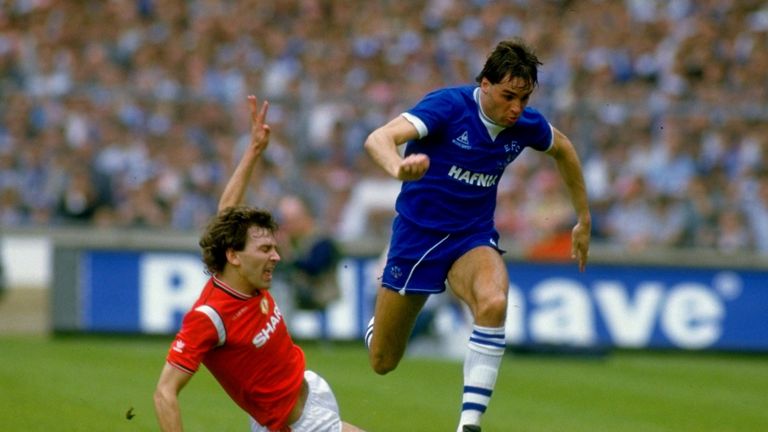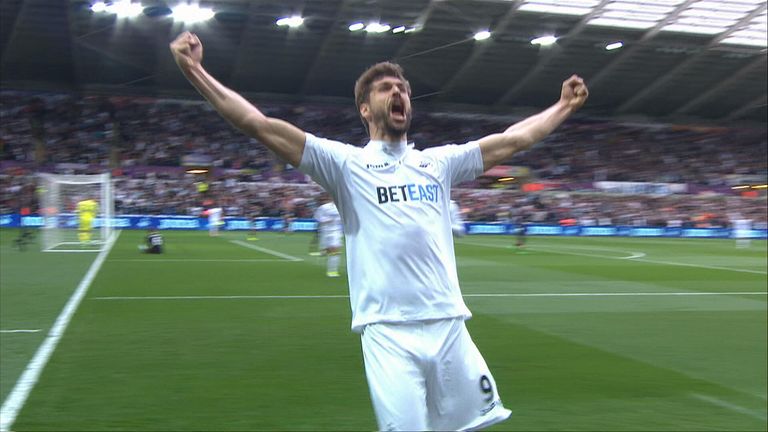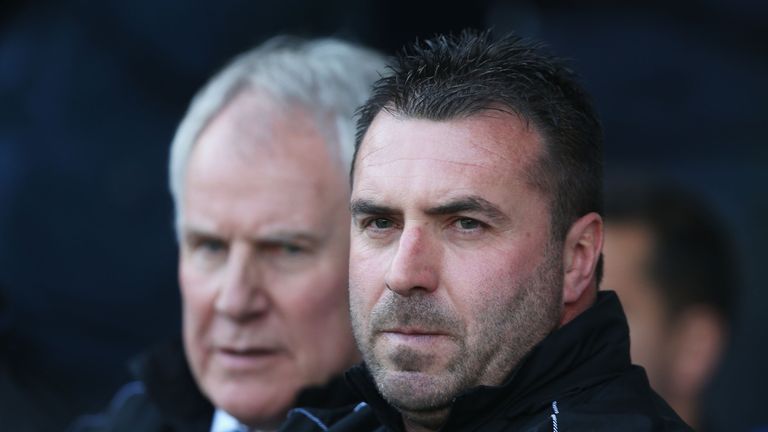Pat Van Den Hauwe reflects on his glittering Everton career, that nickname and returning home
Thursday 11 May 2017 23:29, UK
It was a scruffy goal but one that remains etched in the memory of any Evertonian old enough to remember the day 30 years ago this month.
The Norwich City defence fail to clear a near-post corner. Trevor Steven hooks the ball across the six-yard box where it falls to the left back, who hasn't scored a single goal all season, to smash the loose ball high into the net and secure a second league title in three seasons for Everton.
Much has changed for the club and the scorer of that goal in the intervening years. But three decades on, although he has forgotten most of the details of a fine career, Pat Van Den Hauwe can recall the historic moment.
"I remember drifting into the 18-yard box and Trevor crossed it in after the corner. It just rolled in front of me and without thinking I just closed my eyes and hit it. If I was to start thinking, 'I'll do what Sharpie, Inchy or Andy Gray do and place it,' no chance, it could have gone anywhere."
Two years earlier the men whose goals he is talking about - Graeme Sharp, Adrian Heath and Gray - had led from the front as they clinched the 1984/85 league title. Howard Kendall had built a phenomenal team that is arguably one of the greatest club sides this country has seen. With Neville Southall in goal and a defence of Gary Stevens, Derek Mountfield, Kevin Ratcliffe and Van Den Hauwe, the foundations were built for others to express themselves. The gifted midfield quartet of Steven, Paul Bracewell, Peter Reid and Kevin Sheedy provided a consistent supply line.
Trending
- Transfer Centre LIVE! 'Saudi could offer Rashford way out of Man Utd'
- The Friedkin Group complete Everton takeover
- Lawson confirmed as Verstappen's Red Bull team-mate for 2025
- Papers: Gravenberch set to stay at Liverpool amid Real Madrid links
- Nunez and Elliott strike as Liverpool battle past Southampton
- Gabriel Jesus is back! Hat-trick for Arsenal striker sinks Palace
- World Darts Championship schedule: Smith in action on Thursday
- Man Utd latest: Rashford has not travelled for Carabao Cup tie - reports
- Usyk vs Fury 2: Start time, ring walks, undercard and odds
- Liverpool latest - Slot: Chiesa needs time to get back to his best
Gray had gone by the time the title was wrestled back from Liverpool in the 1986/87 season and injuries had taken their toll on other key performers making Kendall's second title a greater achievement given the resources at his disposal. The lesser lights of Paul Power, Ian Snodin, Paul Wilkinson and Wayne Clarke had come in to supplement the established talent.
"It was absolutely amazing, most of the lads got on with each other. We bonded very well, we stuck together on the field and we played as a unit," Van Den Hauwe recalls. "We didn't have individualists. We had tricky players like Trevor Steven and then Kevin Sheedy with his left foot, but besides that we all worked very hard for each other."
Kendall had dragged the team off the floor in the early Eighties when fans were frustrated at the success across Stanley Park of Liverpool. He seemed to win the trust and loyalty of the players quickly, so what was it like playing for him? "Easy. He was a great fella to work with, easy to get on with. If I had a problem with anything I'd go to him and he'd sort it out," Van Den Hauwe explains. "I don't know how to explain it, he seemed happy-go-lucky, but he had this great charisma. I don't think a lot of players did things wrong playing under Howard. We worked hard and played our matches. Alright, after the matches we did what we wanted, but we had a lot of respect for Howard and we weren't going to let him down."
Van den Hauwe hints at the off-field camaraderie that existed at the time. There were plenty of nights out and Van den Hauwe in particular enjoyed that side of life in Liverpool, admitting that had he played in today's digital age when players' behaviour is under intense scrutiny, he wouldn't have survived, "No, not at all. I'll be truthful, not at all."
Born in Belgium, but raised in some of London's toughest neighbourhoods of Bermondsey, Deptford and Kidbrooke in the 1960s and early 70s, Van Den Hauwe first made his name in a Birmingham City team that gained a reputation for some notorious behaviour around the second city at the time. Noel Blake, Mick Harford and Mark Dennis were amongst his wilder team-mates on and off the field, and ageing lothario Frank Worthington accompanied a young Van Den Hauwe on many a night out in the city.
When Van Den Hauwe moved to Everton in 1984 he quickly earned the nickname 'Psycho Pat' after a fight in a game on Queens Park Rangers' plastic pitch. "That was an incident that happened many years ago and was done and dusted. Howard used to say to all of us, 'Look after each other on the field.' Some people take it differently than others. I didn't think really, it's just one those incidents that happened."
Van Den Hauwe wasn't one of your posturing self-styled hardmen. There was a much darker side to his game that flickered when provoked. The grainy footage on Youtube doesn't do justice to the violence that erupted when striker Gray led with his elbow and floored a Rangers defender. Rangers' midfielder Simon Stainrod reacted and squared up to Gray, only for Van den Hauwe to launch himself at Stainrod in a whirlwind of fists, sparking a mass brawl as he took on all-comers.
"I had bags of ice over both eyes. Then after that the fans started singing that "Psycho, Psycho" thing and it didn't twig at first that they were singing about me and then people told me. To be recognised, even if you're called Psycho, it's being recognised I suppose, so you're doing something right for the club and supporters. Slowly and surely I became very close with the Evertonians."
In 1989 Van den Hauwe's five-year stay at Everton ended when he moved to Tottenham Hotspur. An already chaotic private life became public property when he left his first wife and became involved with Mandy Smith, the former wife of the Rolling Stones' Bill Wyman. The pair went on to marry in 1993, with pictures plastered all over Hello! magazine for good measure, but the marriage was to last only a couple of years.
After a spell at his local club Millwall under Mick McCarthy, Van Den Hauwe gave up on English football and emigrated to South Africa and joined Hellinic in Cape Town. Off the field his drink and drug habit was leading him down a dangerous road. Eventually a third marriage brought more stability to his life and for 17 years he enjoyed a quieter existence, far removed from his days at Everton and Spurs.
"I went somewhere else and just sat back and forgot about it all really," says Van Den Hauwe. "For the 25th anniversary [of the last title win] I flew back from Africa. I was supposed to go on stage, but then when everyone stood up I couldn't do it, I didn't have the bottle. It was too overwhelming for me, it was incredible."
Van den Hauwe is recounting all this over a cup of tea at the Everton Heritage Society which is based in an upstairs room of St Luke's Church on the corner of Goodison Park. Its doors are open every home game for fans to wander about and enjoy the photographs displayed on the walls and the memorabilia from happier times. In 2013 Van den Hauwe divorced for a third time and decided it was time to come back to Merseyside for good. So what brought him 'home'?
"Well that's a long story and I can't tell you the truth, let's just say certain circumstances. I'm glad to be back and I'm really enjoying it, it's been a long time," he explains. "I used to fly back once a year and see friends, but once I put my feet down here and spoke to the club everything just started to fire up again. In the beginning I panicked, to come back to a place like Liverpool, everything was too fast for me because everything is slower over there, but I'm slowly getting there."
Van Den Hauwe now works for Everton In The Community, the club's charitable foundation. "I do walking football, work with people with dementia, refugees and then some work in the lounges on match days. Taking the old boys and girls out and having cups of tea with them, it's really endearing."
It conjures up an interesting juxtaposition from his playing days. How does Psycho Pat cope with the more sedate pace of walking football?
"In the beginning when I started I couldn't get my head around walking football because it's always in my head to run, but once you do it it's a great sport. It's anyone - over 50s mainly, but we've had some teenagers come along as well and they enjoy it. Obviously no one's allowed to kick each other, but it's enjoyable."
On Monday night Van den Hauwe watched Everton's U23 side, managed by David Unsworth, collect the Premier League 2 title. He is enjoying watching the youngsters break through into the first team, "Tom Davies for me, outstanding player," and is cautiously optimistic about the future. Could those glory days ever return for the Blues? "I hope so, it's been far too long."
Reflecting on his own glittering career three decades after Everton's last league championship, Van den Hauwe is proud of the journey he took.
"For me as a young boy playing football growing up in London and then moving on to Birmingham for eight years before coming here to Everton, my Dad always said, 'If you can just play one FA Cup Final in your career that'll do for me. But I ended up playing four. Then there was the League titles and European Cup Winners' Cup, so it was a great achievement."
Despite the excesses of a colourful life, Van Den Hauwe is a shy character off the pitch and admits he has never really come to terms with the adulation he receives from Everton supporters to this day. "They still remember you, it's unbelievable." But no one who saw him play could ever forget the talent and commitment of Psycho Pat, a true Blue legend.
You can see more of our interview with title winners Pat Van den Hauwe and Derek Mountfield, as well as Everton U23s manager David Unsworth and U23s title winner Keiran Dowell, in our extended Everton feature on Soccer Saturday








